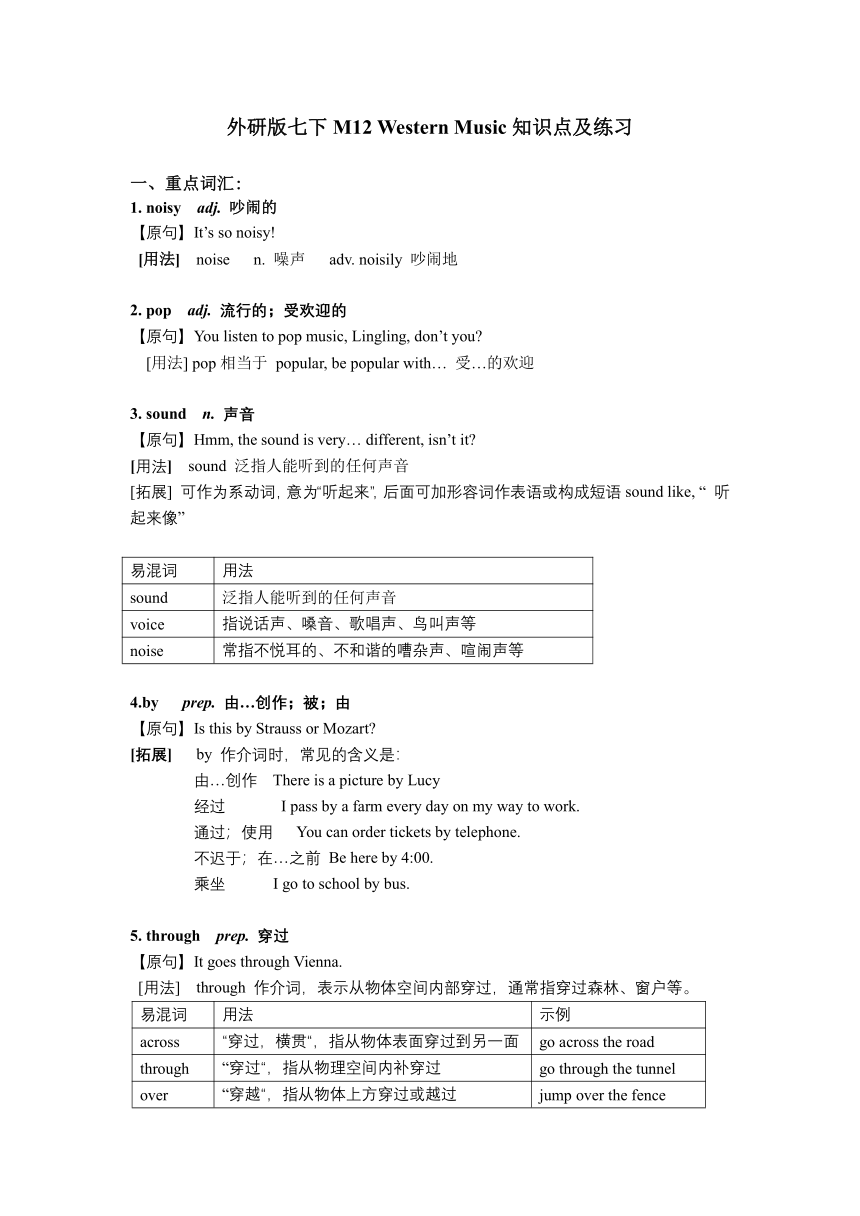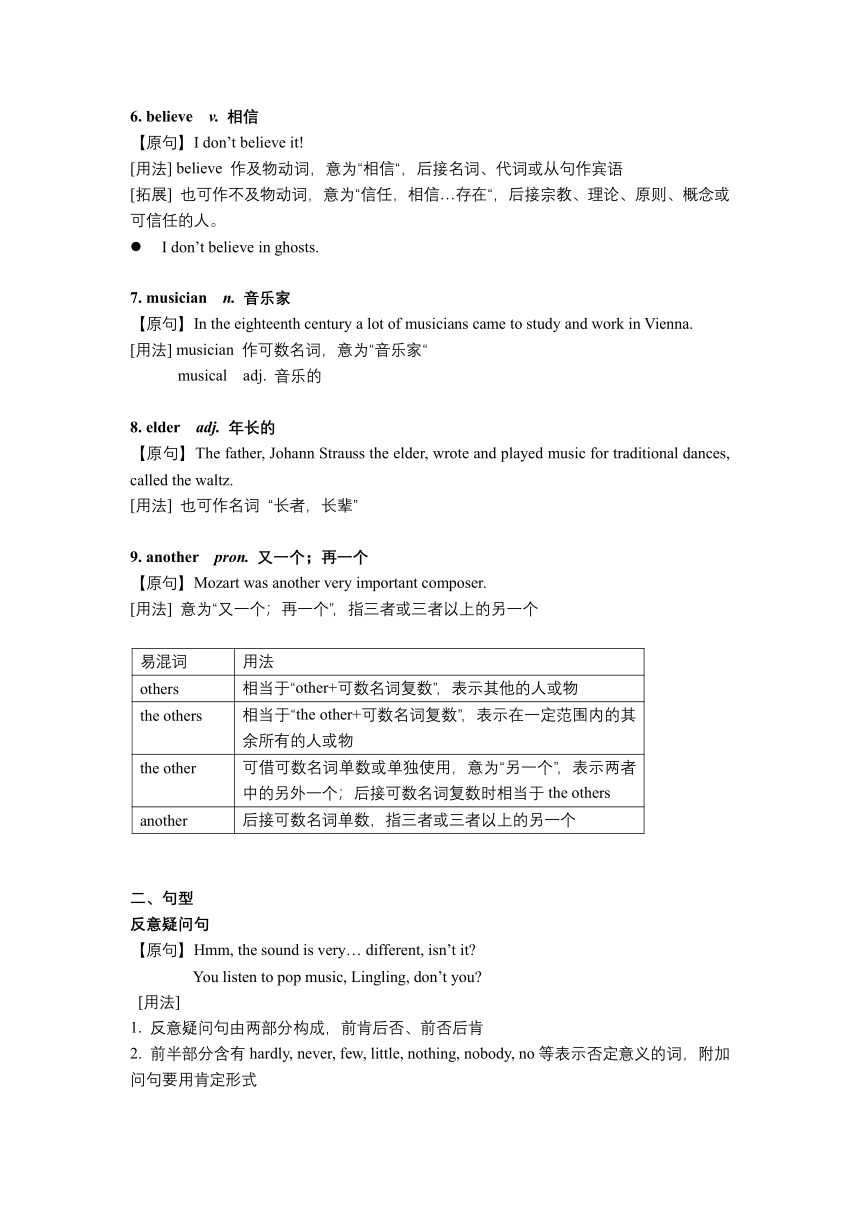Module 12 Western music 重点词组句式和练习(无答案) 外研版七年级英语下册
文档属性
| 名称 | Module 12 Western music 重点词组句式和练习(无答案) 外研版七年级英语下册 |

|
|
| 格式 | docx | ||
| 文件大小 | 30.8KB | ||
| 资源类型 | 教案 | ||
| 版本资源 | 外研版 | ||
| 科目 | 英语 | ||
| 更新时间 | 2023-03-29 00:00:00 | ||
图片预览


文档简介
外研版七下M12 Western Music知识点及练习
一、重点词汇:
1. noisy adj. 吵闹的
【原句】It’s so noisy!
[用法] noise n. 噪声 adv. noisily 吵闹地
2. pop adj. 流行的;受欢迎的
【原句】You listen to pop music, Lingling, don’t you
[用法] pop相当于 popular, be popular with… 受…的欢迎
3. sound n. 声音
【原句】Hmm, the sound is very… different, isn’t it
[用法] sound 泛指人能听到的任何声音
[拓展] 可作为系动词,意为“听起来”,后面可加形容词作表语或构成短语sound like, “ 听起来像”
易混词 用法
sound 泛指人能听到的任何声音
voice 指说话声、嗓音、歌唱声、鸟叫声等
noise 常指不悦耳的、不和谐的嘈杂声、喧闹声等
4.by prep. 由…创作;被;由
【原句】Is this by Strauss or Mozart
[拓展] by 作介词时,常见的含义是:
由…创作 There is a picture by Lucy
经过 I pass by a farm every day on my way to work.
通过;使用 You can order tickets by telephone.
不迟于;在…之前 Be here by 4:00.
乘坐 I go to school by bus.
5. through prep. 穿过
【原句】It goes through Vienna.
[用法] through 作介词,表示从物体空间内部穿过,通常指穿过森林、窗户等。
易混词 用法 示例
across “穿过,横贯“,指从物体表面穿过到另一面 go across the road
through “穿过“,指从物理空间内补穿过 go through the tunnel
over “穿越“,指从物体上方穿过或越过 jump over the fence
6. believe v. 相信
【原句】I don’t believe it!
[用法] believe 作及物动词,意为“相信“,后接名词、代词或从句作宾语
[拓展] 也可作不及物动词,意为“信任,相信…存在“,后接宗教、理论、原则、概念或可信任的人。
I don’t believe in ghosts.
7. musician n. 音乐家
【原句】In the eighteenth century a lot of musicians came to study and work in Vienna.
[用法] musician 作可数名词,意为“音乐家“
musical adj. 音乐的
8. elder adj. 年长的
【原句】The father, Johann Strauss the elder, wrote and played music for traditional dances, called the waltz.
[用法] 也可作名词 “长者,长辈”
9. another pron. 又一个;再一个
【原句】Mozart was another very important composer.
[用法] 意为“又一个;再一个”,指三者或三者以上的另一个
易混词 用法
others 相当于“other+可数名词复数”,表示其他的人或物
the others 相当于“the other+可数名词复数”,表示在一定范围内的其余所有的人或物
the other 可借可数名词单数或单独使用,意为“另一个”,表示两者中的另外一个;后接可数名词复数时相当于the others
another 后接可数名词单数,指三者或三者以上的另一个
二、句型
反意疑问句
【原句】Hmm, the sound is very… different, isn’t it
You listen to pop music, Lingling, don’t you
[用法]
1. 反意疑问句由两部分构成,前肯后否、前否后肯
2. 前半部分含有hardly, never, few, little, nothing, nobody, no等表示否定意义的词,附加问句要用肯定形式
三、 重点语法1:感叹句
【原句】What a beautiful city!
1. 概念:表示强烈感情的感叹句通常由how 或what 来引导
2. 基本句式
(1)What a/ an +形容词+可数名词单数(+主语+谓语)!
What a careful boy he is!
(2)What + 形容词+ 可数名词复数或不可数名词(+主语+谓语)!
What good news!
(3)How+ 形容词/副词(+主语+谓语)!
How fast he runs!
重点语法2:选择疑问句
【原句】Do you like traditional Western music or pop music, Betty
概念: 指提供两种或多种情况供对方选择的疑问句
基本句式:
1. 一般疑问句+ or+其他部分
Are you a doctor or a teacher
2. 特殊疑问句,选项A+ or + 选项B
Which would you like, tea or coffee
3. 回答
不能用Yes/ No 来回答, 一般在所提供的备选对象范围内选择。
练习:
Vocabulary
1. Beijing opera is (difference) from classical music.
2. Do you know the girl (call) Betty.
3.Many football (fan) went to watch the football match.
4.The old man likes (tradition) music, but he doesn’t like rock music.
5.He is one of the famous (music) in China.
6.Would you like to come to my (eighteen) birthday party.
7. It is so (noise) here that the baby can’t go to sleep.
8. Some of the students in the class are from (Europe) countries.
9. You should be (politely)to the teachers.
10. It’s (danger)to wave goodbye to Greece people.
11.Many (visit) came to China to see the Great Wall.
12. (not forget) ( close) the door when you leave.
13. This is the (good) way of (learn) English.
14. A (woman) age is secret in the (west) countries.
15. You can’t ( play) if you don’t finish (do)your homework.
16. It isn’t polite (laugh)at others.
二、句型转换
1.She can speak both Chinese and English.(改为同义句)
She can speak Chinese English.
2. Her sister likes swimming. (用play tennis改为选择疑问句)
her sister swimming tennis
3. Weifang is a beautiful city. (改为感叹句)
Weifang is!
4. Shared-bikes are very popular in some big cities.(改为感叹句)
Shared-bikes are in some big cities!
5. When he was 12 years old, Mozart wrote his first opera. (改为同义句)
Mozart wrote his first opera 12.
6. We can hear classical music in Vienna.(用 in New York改为选择疑问句)
you hear classical music, in Vienna in New York
7. You’d better not be late for class next time.(改为祈使句)
for class next time.
other/ others/ the other/ the others/ another
1.The dress is too small. Please show me ________ one.
2.He has two cars. One is black, ________ is white.
3.There are 50 students in my class. 25 are boys, ________ are girls.
4.There are many students on the playground. Some are playing basketball, ________ are playing football.
5.He is taller than any ________ boy in his class.
答案: another, the other, the others, others, other
反意疑问句
1.Zhou Ming has few English magazines, ________
A.does he B.doesn’t heC.has he D.hasn’t he
2.Cindy could hardly speak English three years ago, ________
A. couldn't she B. could she C. can she
3.---He hardly spent any time on his subjects, ________
---________, so he does badly in his lessons.
A .didn’t he, Yes B. did he, Yes C. didn’t he, No D. did he, No
4.Nancy hardly rings you up, ___________
A. doesn’t she B. does sheC. doesn’t Nancy D. does Nancy
through / across/ over
1. She swam ________ the river.
2. The man jumped ________ the wall and went away.
3. He walked ________ the forest.
一、重点词汇:
1. noisy adj. 吵闹的
【原句】It’s so noisy!
[用法] noise n. 噪声 adv. noisily 吵闹地
2. pop adj. 流行的;受欢迎的
【原句】You listen to pop music, Lingling, don’t you
[用法] pop相当于 popular, be popular with… 受…的欢迎
3. sound n. 声音
【原句】Hmm, the sound is very… different, isn’t it
[用法] sound 泛指人能听到的任何声音
[拓展] 可作为系动词,意为“听起来”,后面可加形容词作表语或构成短语sound like, “ 听起来像”
易混词 用法
sound 泛指人能听到的任何声音
voice 指说话声、嗓音、歌唱声、鸟叫声等
noise 常指不悦耳的、不和谐的嘈杂声、喧闹声等
4.by prep. 由…创作;被;由
【原句】Is this by Strauss or Mozart
[拓展] by 作介词时,常见的含义是:
由…创作 There is a picture by Lucy
经过 I pass by a farm every day on my way to work.
通过;使用 You can order tickets by telephone.
不迟于;在…之前 Be here by 4:00.
乘坐 I go to school by bus.
5. through prep. 穿过
【原句】It goes through Vienna.
[用法] through 作介词,表示从物体空间内部穿过,通常指穿过森林、窗户等。
易混词 用法 示例
across “穿过,横贯“,指从物体表面穿过到另一面 go across the road
through “穿过“,指从物理空间内补穿过 go through the tunnel
over “穿越“,指从物体上方穿过或越过 jump over the fence
6. believe v. 相信
【原句】I don’t believe it!
[用法] believe 作及物动词,意为“相信“,后接名词、代词或从句作宾语
[拓展] 也可作不及物动词,意为“信任,相信…存在“,后接宗教、理论、原则、概念或可信任的人。
I don’t believe in ghosts.
7. musician n. 音乐家
【原句】In the eighteenth century a lot of musicians came to study and work in Vienna.
[用法] musician 作可数名词,意为“音乐家“
musical adj. 音乐的
8. elder adj. 年长的
【原句】The father, Johann Strauss the elder, wrote and played music for traditional dances, called the waltz.
[用法] 也可作名词 “长者,长辈”
9. another pron. 又一个;再一个
【原句】Mozart was another very important composer.
[用法] 意为“又一个;再一个”,指三者或三者以上的另一个
易混词 用法
others 相当于“other+可数名词复数”,表示其他的人或物
the others 相当于“the other+可数名词复数”,表示在一定范围内的其余所有的人或物
the other 可借可数名词单数或单独使用,意为“另一个”,表示两者中的另外一个;后接可数名词复数时相当于the others
another 后接可数名词单数,指三者或三者以上的另一个
二、句型
反意疑问句
【原句】Hmm, the sound is very… different, isn’t it
You listen to pop music, Lingling, don’t you
[用法]
1. 反意疑问句由两部分构成,前肯后否、前否后肯
2. 前半部分含有hardly, never, few, little, nothing, nobody, no等表示否定意义的词,附加问句要用肯定形式
三、 重点语法1:感叹句
【原句】What a beautiful city!
1. 概念:表示强烈感情的感叹句通常由how 或what 来引导
2. 基本句式
(1)What a/ an +形容词+可数名词单数(+主语+谓语)!
What a careful boy he is!
(2)What + 形容词+ 可数名词复数或不可数名词(+主语+谓语)!
What good news!
(3)How+ 形容词/副词(+主语+谓语)!
How fast he runs!
重点语法2:选择疑问句
【原句】Do you like traditional Western music or pop music, Betty
概念: 指提供两种或多种情况供对方选择的疑问句
基本句式:
1. 一般疑问句+ or+其他部分
Are you a doctor or a teacher
2. 特殊疑问句,选项A+ or + 选项B
Which would you like, tea or coffee
3. 回答
不能用Yes/ No 来回答, 一般在所提供的备选对象范围内选择。
练习:
Vocabulary
1. Beijing opera is (difference) from classical music.
2. Do you know the girl (call) Betty.
3.Many football (fan) went to watch the football match.
4.The old man likes (tradition) music, but he doesn’t like rock music.
5.He is one of the famous (music) in China.
6.Would you like to come to my (eighteen) birthday party.
7. It is so (noise) here that the baby can’t go to sleep.
8. Some of the students in the class are from (Europe) countries.
9. You should be (politely)to the teachers.
10. It’s (danger)to wave goodbye to Greece people.
11.Many (visit) came to China to see the Great Wall.
12. (not forget) ( close) the door when you leave.
13. This is the (good) way of (learn) English.
14. A (woman) age is secret in the (west) countries.
15. You can’t ( play) if you don’t finish (do)your homework.
16. It isn’t polite (laugh)at others.
二、句型转换
1.She can speak both Chinese and English.(改为同义句)
She can speak Chinese English.
2. Her sister likes swimming. (用play tennis改为选择疑问句)
her sister swimming tennis
3. Weifang is a beautiful city. (改为感叹句)
Weifang is!
4. Shared-bikes are very popular in some big cities.(改为感叹句)
Shared-bikes are in some big cities!
5. When he was 12 years old, Mozart wrote his first opera. (改为同义句)
Mozart wrote his first opera 12.
6. We can hear classical music in Vienna.(用 in New York改为选择疑问句)
you hear classical music, in Vienna in New York
7. You’d better not be late for class next time.(改为祈使句)
for class next time.
other/ others/ the other/ the others/ another
1.The dress is too small. Please show me ________ one.
2.He has two cars. One is black, ________ is white.
3.There are 50 students in my class. 25 are boys, ________ are girls.
4.There are many students on the playground. Some are playing basketball, ________ are playing football.
5.He is taller than any ________ boy in his class.
答案: another, the other, the others, others, other
反意疑问句
1.Zhou Ming has few English magazines, ________
A.does he B.doesn’t heC.has he D.hasn’t he
2.Cindy could hardly speak English three years ago, ________
A. couldn't she B. could she C. can she
3.---He hardly spent any time on his subjects, ________
---________, so he does badly in his lessons.
A .didn’t he, Yes B. did he, Yes C. didn’t he, No D. did he, No
4.Nancy hardly rings you up, ___________
A. doesn’t she B. does sheC. doesn’t Nancy D. does Nancy
through / across/ over
1. She swam ________ the river.
2. The man jumped ________ the wall and went away.
3. He walked ________ the forest.
同课章节目录
- Module 1 Lost and found
- Unit 1 Whose bag is this?
- Unit 2 Are they yours?
- Unit 3 Language in use
- Module 2 What can you do ?
- Unit 1 I can play the piano
- Unit 2 I can run really fast
- Unit 3 Language in use
- Module 3 Making plans
- Unit 1 What are you going to do at the weekends?
- Unit 2 We're going to cheer the players.
- Unit 3 Language in use
- Module 4 Life in the future
- Unit 1 Everyone will study at home
- Unit 2 Every family will have a small plane.
- Unit 3 Language in use
- Module 5 Shopping
- Unit 1 What can I do for you?
- Unit 2 You can buy everything on the Internet
- Unit 3 Language in use
- Module 6 Around town
- Unit 1 Could you tell me how to get to the Nationa
- Unit 2 The London Eye is on your right.
- Unit 3 Language in use
- Revision module A
- Module 7 My past life
- Unit 1 I was born in a small village.
- Unit 2 I was born in Quincy.
- Unit 3 Language in use
- Module 8 Story time
- Unit 1 Once upon a time….
- Unit 2 Goldilocks hurried out of the house.
- Unit 3 Language in use
- Module 9 Life history
- Unit 1 He left school and began work at the age of
- Unit 2 He decided to be an actor.
- Unit 3 Language in use
- Module 10 A holiday journey
- Unit 1 What did you do?
- Unit 2 This morning we took a walk.
- Unit 3 Language in use
- Module 11 Body language
- Unit 1 They touch noses!
- Unit 2 Here are some ways to welcome them.
- Unit 3 Language in use
- Module 12 Western music
- Unit 1 It's so beautiful!
- Unit 2 Vienna is the centre of European classical
- Unit 3 Language in use
- Revision module B
